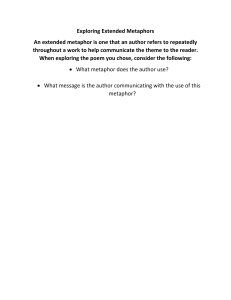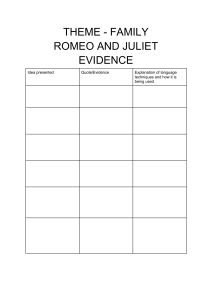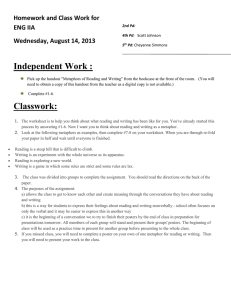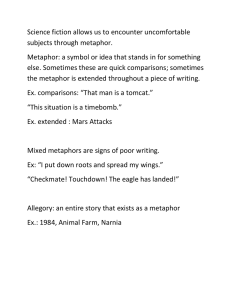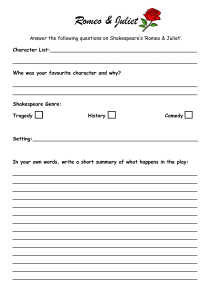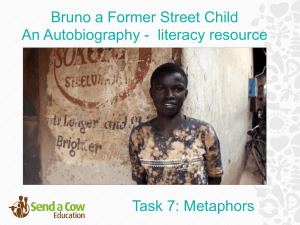Rhetorical Devices: Absolute Language, Questions, Metaphors
advertisement
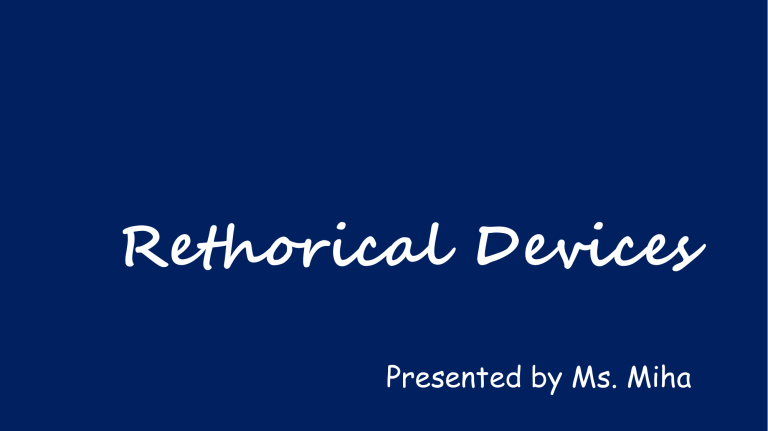
Rethorical Devices Presented by Ms. Miha Absolute / Extreme Language • Makes an exaggerated, overblown, and probably untrue claim. • It’s freezing. • I’m so hungry, I could eat a horse. • That was the best movie ever! SOME EXAMPLES OF Extreme or Absolute Language • every, always, indisputably, unarguably, none, never, no one • completely, no doubt, without question • entirely, worst, best… • hungriest, funniest, starving, meanest • ever, very, all • severe, massive, all-knowing When you see extreme or absolute language you need to ask yourself: • “Why did the author use this language?” • “What does this reveal about the author’s purpose? • The answer will tell you something about the author’s pointof-view and purpose, or you might realize the author is exaggerating to make you think a certain way. Practice https://www.liveworksheets.com/rv2189574nm Rhetorical Questions • A rhetorical question is a question asked to make a point, rather than get an answer. • If you have ever been late, someone might say: 'What time do you call this? • ' This person doesn't want an answer to the question. They are making the point that you have arrived at an unacceptable time. Purpose of rhetorical questions • it's a question asked not for the answer, but for the effect • persuade or subtly influence the audience • evokes emotions • to emphasize a point • just to get the audience thinking. • Predict the audiences questions For example, "As a dog owner you may think 'What should I be focusing on to keep my dog healthy?' The answer is providing your dog with the correct nutrition and therefore food." Writing to persuade • As there is nobody to answer the question, a rhetorical question is usually designed to speak directly to the reader. • It allows the reader a moment to pause and think about the question. For that reason, they are effective in hooking a reader’s interest and making them think about their own response to the question in hand. • 'Who wouldn't want to be a millionaire?’ • ‘Do we really want our planet to survive?’ • 'Wouldn’t you feel happier if you could wear what you wanted to school?' Romeo and Juliet • In Shakespeare's play Romeo and Juliet, a young couple fall in love but are forced apart by their rival families: the Montagues and the Capulets. Juliet makes a point that a person's name should not define them: 'What’s in a name? That which we call a rose by any other name would smell as sweet.’ • This emphasizes her point that names are meaningless. A rose being called a rose does not define how good it smells in the same way that people are not defined by their names or their family. The Merchant of Venice • Shakespeare's play The Merchant of Venice looks at the divide between the Jewish and Christian faiths. In the following quote, rhetorical questions are used to highlight that all humans are the same regardless of their religion: 'If you prick us do we not bleed? If you tickle us do we not laugh?’ • The answers to these questions are obvious: everyone bleeds if they are cut and most people laugh if they are tickled. • The rhetorical questions are not designed to be answered instead they emphasise the idea that all humans are created equal. "Are we a nation that tolerates the hypocrisy of a system where workers who pick our fruit and make our beds never have a chance to get right with the law? Are we a nation that accepts the cruelty of ripping children from their parents' arms? Or are we a nation that values families, and works to keep them together?" - Obama's Immigration Address Metaphor • describes an object or action in a way that isn't literally true, but helps explain an idea or make a comparison. ... A metaphor states that one thing is another thing. It equates those two things not because they actually are the same, but for the sake of comparison or symbolism. You are the black sheep of your family. Extended metaphors An extended metaphor is a version of metaphor that extends over the course of multiple lines, paragraphs, or stanzas of prose or poetry. Extended metaphors build upon simple metaphors with figurative language and more varied, descriptive comparisons. Extended metaphors An extended metaphor is a version of metaphor that extends over the course of multiple lines, paragraphs, or stanzas of prose or poetry. Extended metaphors build upon simple metaphors with figurative language and more varied, descriptive comparisons. Metaphor • A word or phrase for one thing that is used to refer to another thing in order to show or suggest that they are similar • An object, activity, or idea that is used as a symbol of something else • Love is a battlefield. • Bob is a couch potato. • I am titanium. All the world’s a stage, and all the men and women merely players. They have their exits and their entrances. William Shakespeare America has tossed its cap over the wall of space. John F. Kennedy Chaos is a friend of mine. Bob Dylan A good conscience is a continual Christmas. Benjamin Franklin Extended metaphors An extended metaphor is a version of metaphor that extends over the course of multiple lines, paragraphs, or stanzas of prose or poetry. Extended metaphors build upon simple metaphors with figurative language and more varied, descriptive comparisons. William Shakespeare, Romeo and Juliet: Upon seeing Juliet for the first time, Romeo delivers a monologue that features an extended metaphor comparing Juliet to the sun. “But, soft! What light through yonder window breaks? / It is the east, and Juliet is the sun.” Once Shakespeare establishes the terms of his initial metaphor (“Juliet is the sun”) he elaborates on the qualities of the sun and extends its function “arise, fair sun, and kill the envious moon”. The extended metaphor serves to highlight Romeo’s intense passion and immediate love upon seeing Juliet. Emily Dickinson, ‘Hope’ is the thing with feathers: She compares the feeling of hope to a little bird. Dickinson emphasizes the resiliency and strength that hope can provide by illustrating the many places the ‘bird’ can be found: “I’ve heard it in the chillest land - / And on the strangest Sea”. The entire poem functions as an extended metaphor comparing hope to a bird capable of weathering any storm. • If you want to intensify the scene with a fire breaking out, you might say: The flames of the fire shot up faster than a trio of lightning bolts. The thunderous roar of the ceiling’s collapse was loud enough to wake the dead. In a moment’s time, I learned Clare knew how to drive, and I mean really drive. The flames nipped at our rear bumper but not even those lightning bolts could catch us now. ”Life is a highway.” "Life is a highway that takes us through green pastures, vast deserts, and rocky mountains. Sometimes your car breaks down or you run out of gas, and sometimes you get lost. Friends are the roadmaps that help you get where you're going." All metaphors can be broken down into two elements: a tenor and a vehicle. The tenor is the thing a metaphor describes. The vehicle is the thing to which the tenor is compared. • For instance, in the metaphor "Life is a highway," life is the tenor because it's the thing being described, while "highway" is the vehicle because it's the thing life is being compared to Why Do Writers Use Extended Metaphors? • To explain or describe an abstract concept in vivid and memorable terms. • To help the reader make a new, insightful connection between two different entities that might not have seemed related. • To help communicate personal or imaginary experiences in terms to which readers can relate. • To lead the reader to surprising and important discoveries by connecting different spheres of experience and language. The figurative meaning that metaphors create can help a reader to see the world or a concept in a new way. Homework https://www.youtube.com/watch?v=KSbwHzlcgs8 Identify the extended metaphors in Katy Perry’s song
